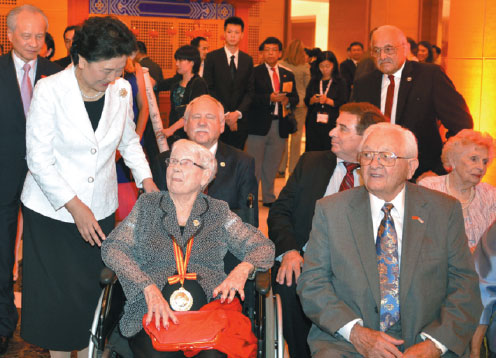Flying tigers a symbol of friendship, then and now
By Joseph Catanzaro, Li Yang,Huang Zhiling and An Baijie (China Daily) Updated: 2015-06-26 07:45
|
Vice-Premier Liu Yandongmeets Flying Tigers pilots and their families inWashington on Thursday. Wang Lei / Xinhua |
"The first three months we operated in China, 12 of our squadron of 16 airplanes were lost," he said. "They were lost either by Japanese attacks, or anti-aircraft fire from the ground, or simply crashing into a mountain. I had a lot of close calls."
The help from Chinese allies was vital, he said. "We had something called the Chinese net, an early warning system, maintained by the Chinese. They would warn us when enemy airplanes were approaching, so we could put our planes in the air.
"Some of the crews were able to bail out or make crash landings (after they were shot down). We had several cases in our squadron where men had to bail out of their airplane and were helped back to friendly lines by the Chinese. It was very reassuring."
In Yangtang in 1944, villages carried the downed US airman, who had wounds to his legs, using a wooden board, traveling through the night until they reached a US air base near Guilin in the early hours. Long said he guided the way through the darkness with an oil lamp.
Despite the divides in culture and language, Long, now 81 and a retired police officer, has no doubt he helped save a friend and ally that night.
"All my family died in the Japanese bombings," he said. "The Flying Tigers helped me to take revenge. I regard their families as my family. I'm honored to have helped save that injured US pilot, even though I never knew his name."







